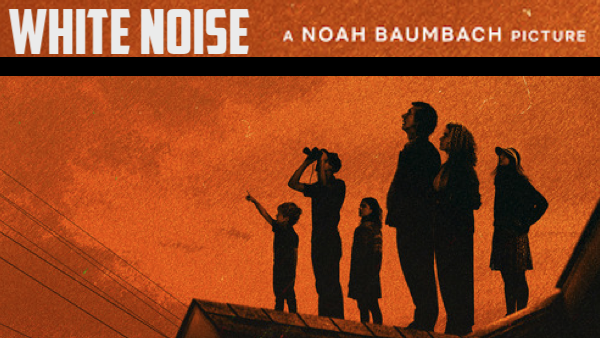White Noise: A Faithful Adaptation Of Don DeLillo's Death-Obsessed Postmodern Masterwork
Jack Gladney, professor of Hitler studies at the College-on-the-Hill, husband to Babette and father to four children, is torn asunder by "the Airborne Toxic Event", a cataclysmic train accident that casts chemical waste over his town.
Noah Baumbach steps out of his comfort zone and reaches for the stars by taking on Don DeLillo’s quintessential postmodern work, White Noise, a novel about humanity’s obsession with and fear of death and the lengths we’ll go to forget our own mortality. Although he doesn’t completely knock it out of the park, Baumbach’s ambition and overall ability to articulate DeLillo’s heady bombardment of ideas and musings on modern American living is certainly commendable. He admittedly struggles a bit under the weight of the novel’s cerebral themes and concepts, but he manages to get DeLillo’s point across and proves that it’s not as “unfilmable” as many had suspected. That said, like many adaptations, Baumbach’s White Noise doesn’t quite stack up to the monumental achievement of its source material, but his faithful and inspired rendering sufficiently captures its essence — and with a great deal of gusto and panache to boot.
With its colorful characters, overwhelming chaos, and overlapping dialogue, the film melds Robert Altman vibes with Spielbergian apocalyptic panic and the quirky familial drama that Baumbach’s become well-known for. It’s a strange fusion that’s a bit clunky and sometimes at odds with itself, but there’s also an undeniable genius to this dark comedy as well. Like DeLillo’s novel, the film, primarily centers around Jack Gladney and his family as their eccentric lives are plunged into turmoil by an “airborne toxic event.” Existential dread looms as large as big, black poisonous clouds, and it’s really only placated by the fluorescent glow of the supermarket or an unknown pharmaceutical called Dylar. A swirl of catastrophe and consumerism, broad comedy and slapstick, with a plot that marches forever “deathward,” the film continually evolves, inhabiting different genres, as it grapples with the universal mysteries of love, death, and the possibility of happiness in an uncertain world.
It takes awhile to fall in line the film’s strange rhythm, but once you’re in synch with its well-manicured and orchestrated chaos, you’re in for a pretty entertaining and humorous ride. If you’re a fan of DeLillo’s novel, you’re likely to find more joy than disappointment, but it may prove to be a bit of a struggle for those who are unfamiliar with the book and its themes. Like the source material, the film is very dense, and it can be difficult to fully appreciate the ideas presented in its dialogue because it zooms by or is overlaid with other bits of conversations. There’s a lot to unpack, and a lot that can be missed, which merits additional watches, but you can’t quite savor it like you can with a book.
Some of its best bits are plucked straight from DeLillo’s novel, and they’re really exciting to watch play out on screen, especially if you’ve read the book. Naturally, certain cuts had to be made to ensure it could be more easily wielded. The “most photographed barn in the world” and the book’s final chapter, which really solidifies the books themes and distills them into one masterfully written scene, are the most notable pieces that were excluded. The former is a smart cut, but the decision to omit the end of DeLillo’s book seems like a major misstep. Another issue is how there are several instances where it feels actors stiffly reading novel dialogue, making some scenes feel more like a play than a film, but this is mostly apparent in the first 30 minutes and it finds more solid footing as it moves along.
White Noise’s existential dread and palpable pandemonium wears a bit thin, and it definitely falters a bit in its final section where it loses a bit of momentum, but it’s never uninteresting, uninspired, or unenthusiastic. Adam Driver really has a firm grasp on the material, and he’s pleasure to watch, as usual. Greta Gerwig, Raffey Cassidy, and Don Cheadle give solid support, but the true star here is Baumbach, whose “go big or go home” we found to be highly rewarding. The costumes and set design really give the film’s period aspects a lovely bit of added personality as well. Regardless of your feelings on the film, it did get LCD Soundsystem to come out of retirement to contribute the closing track for the film, and that’s definitely worth a, “hell yeah!” Of course, there’s more than that to cheer about, but you really need to be the right audience, and Baumbach’s ambitious banger is a bit too esoteric for the masses.
Recommendation: Unless you’re a fan of Don DeLillo’s book, you might not appreciate the feat that Baumbach pulled off here. You’ll see glimmers of the beloved filmmakers typical behavior here, but he largely entered another sphere with White Noise, and it’s not likely to fully resonate unless you have the proper foundation.
Need to curb your existential dread?! Check out the links below:
Marriage Story review
Top Five Film Scores of 2019
The Last Duel review
BlacKkKlansman review
House Of Gucci review
The Killing Of A Sacred Deer review
Lady Bird review
Little Women review
What do you think? We want to know. Share your thoughts and feelings in the comments section below, and as always, remember to viddy well!



